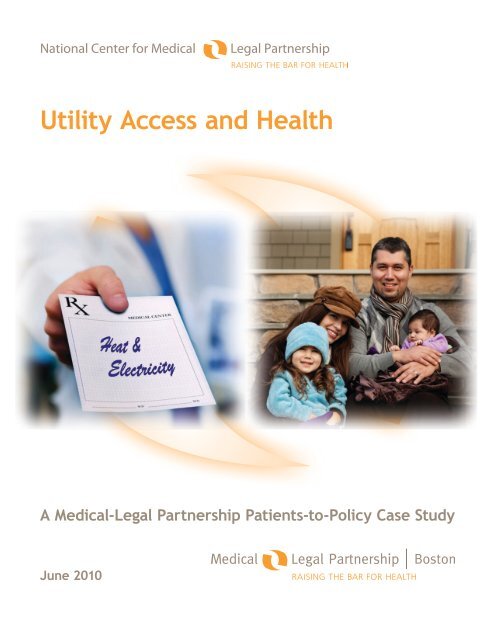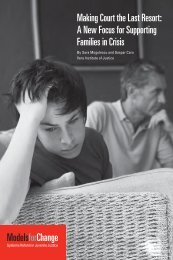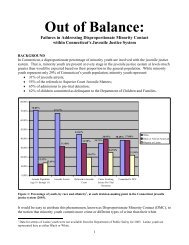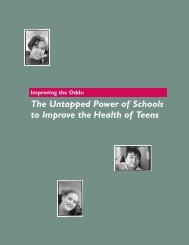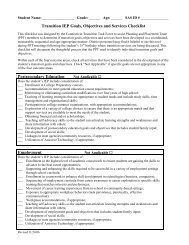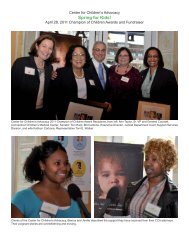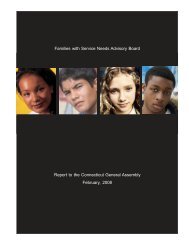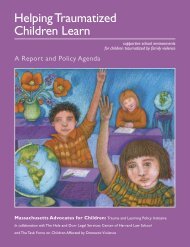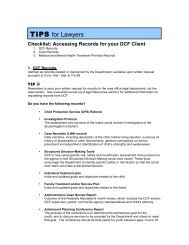Utility Access and Health - Center for Children's Advocacy
Utility Access and Health - Center for Children's Advocacy
Utility Access and Health - Center for Children's Advocacy
Create successful ePaper yourself
Turn your PDF publications into a flip-book with our unique Google optimized e-Paper software.
National <strong>Center</strong> <strong>for</strong> MedicalLegal Partnership<strong>Utility</strong> <strong>Access</strong> <strong>and</strong> <strong>Health</strong>A Medical-Legal Partnership Patients-to-Policy Case StudyJune 2010
AuthorsThis report was prepared by:Adam SegeNational <strong>Center</strong> <strong>for</strong> Medical-Legal PartnershipSignificant contributions were made by:JoHanna Flacks, JD, Pro Bono DirectorMedical-Legal Partnership | BostonChong-Min Fu, Research AssistantNational <strong>Center</strong> <strong>for</strong> Medical-Legal PartnershipCharlie Harak, JD, AttorneyNational Consumer Law <strong>Center</strong>, Boston, MAKate Marple, National Program CoordinatorNational <strong>Center</strong> <strong>for</strong> Medical-Legal PartnershipSamantha Morton, JD, Executive DirectorMedical-Legal Partnership | BostonBonnie Roswig, JD, Staff AttorneyMedical-Legal Partnership Project, Hart<strong>for</strong>d, CTMegan S<strong>and</strong>el, MD, MPH, Medical DirectorNational <strong>Center</strong> <strong>for</strong> Medical-Legal PartnershipKathy Tobin, Director of Energy ServicesAction <strong>for</strong> Boston Community Development, Inc.About this ReportMedical-legal partnerships operate at the intersection of publicpolicy <strong>and</strong> patient care <strong>and</strong> are uniquely positioned to identifyareas <strong>for</strong> institutional, regulatory <strong>and</strong> legislative change thataffect patient health.Using Medical-Legal Partnership | Boston’s utility advocacyas a backdrop, this report highlights the impact medical-legalpartnership can have on systems change <strong>and</strong> underscores theneed <strong>for</strong> active medical-legal partnerships to exp<strong>and</strong> upon theirdynamic service delivery model <strong>for</strong> a broader impact on policy.To address the problem of utility access <strong>for</strong> low-income patientsat Boston Medical <strong>Center</strong> (BMC), BMC health care providers<strong>and</strong> MLP | Boston’s legal team began by training front linehealthcare staff <strong>and</strong> providing direct legal assistance to lowincomefamilies, <strong>and</strong> then created institutional solutions that ledto systemic impact across the state.AcknowledgmentsThe development of this report was made possible bygenerous support from the WK Kellogg Foundation.Medical-Legal Partnership | Boston’s utility advocacyhas been supported by the following organizations:Bank of AmericaMcDermott, Will & EmeryBoston Bar FoundationPaul <strong>and</strong> Phyllis Fireman FoundationMary A. <strong>and</strong> John M. McCarthy FoundationState Street FoundationMassachusetts Department of Public <strong>Health</strong>We are also grateful to the Children’s <strong>Health</strong>Watch <strong>and</strong> theNational Energy Assistance Director’s Association <strong>for</strong> theirexpertise.The National <strong>Center</strong> <strong>for</strong> Medical-Legal Partnership <strong>and</strong>Medical-Legal Partnership | Boston are programs ofBoston Medical <strong>Center</strong> <strong>and</strong> the Boston UniversitySchool of Medicine.
The Energy Crisis <strong>and</strong> Its Impact onLow-Income Individuals & FamiliesConsider a blackout on a steamy summer afternoon. Inan instant, the lights go out, the air conditioner shutsoff, <strong>and</strong> the milk in the refrigerator starts to spoil. It’san unpleasant surprise, but at least the utility companyis working to get the power on as soon as they can.Yet <strong>for</strong> a growing number of Americans, utility companiesare actually doing the opposite ― they’re turningthe power off. With energy prices rising amidst a deeprecession, millions of people are falling behind onenergy bills. When the lights go out <strong>for</strong> these families,it’s not because of a downed power line; it’s becausethey can’t af<strong>for</strong>d to keep them on. 1Figure 1 2PRICE(Dollars per Thous<strong>and</strong> Cubic Feet)# of LettersU.S. Price of Natural Gas Delivered to Residential Consumer16141210864208001995 1996 1997 1998 1999 2000 2001 2002 2003 2004 2005 2006 2007 2008YEARWhen a household loses utility service, the potentialhealth consequences are severe <strong>and</strong> wide ranging. Coldweather can be a trigger to asthma, <strong>and</strong> low temperaturescan cause intense pain crises <strong>for</strong> childrenProtection Letters Written in BMC Pediatric Clinicwithsickle cell disease. 3 When family members who are700676chronically ill or disabled rely on refrigerated medicine600or electronic medical equipment in their homes, the500481risks during power outages are especially grave.400352Even 300 <strong>for</strong> low-income households that manage to paytheir 200 utility193bills, high energy costs often <strong>for</strong>ce familiesto 100 dig into their food budget, exposing them to othernegative 0 health outcomes. 4 Households in poverty2005-2006 2006-2007 2007-2008 2008-2009YEARoften sacrifice rent payments, medical <strong>and</strong> dental care,<strong>and</strong> food in order to pay their energy bills, which canconsume 16 to 25 percent of their annual income. 5“When families are <strong>for</strong>ced to make this ‘heat or eat’tradeoff, it’s a no win situation,” says Lauren Smith,Medical Director of the Massachusetts Department ofPublic <strong>Health</strong>. “You can’t give up a balanced diet orenergy access <strong>and</strong> expect to stay healthy, but <strong>for</strong> more<strong>and</strong> more families, there’s just not enough money topay <strong>for</strong> both.”While federal <strong>and</strong> state governments provide smallgrants to individuals <strong>and</strong> families at or below povertyguidelines through the low-income home energyassistance program (LIHEAP), only about 7.5 millionhouseholds, or one quarter of eligible householdsnationwide, received grants in 2009. 6The threat of utility shut-off confronts virtually all ofthe 24 million low-income households in the U.S. Fortyseven states offer some <strong>for</strong>m of utility shut-off protection7 , a guarantee of uninterrupted utility access <strong>for</strong>vulnerable individuals <strong>and</strong> families. Shut-off protectionrequires a doctor’s letter at specified intervals<strong>and</strong> varies drastically by state based on time of year,cold weather <strong>and</strong> illness. Shut-off protection ensurescontinued access to heat <strong>and</strong> electricity, but does noterase utility debt or reduce cost to the consumer.Shut-off protection programs vary greatly from stateto state. Alabama <strong>and</strong> Arizona have temperature basedrequirements, while Massachusetts <strong>and</strong> Washingtonoffer utilities protection only during certain monthsof the year. 8 Fewer than a dozen states have shut-offprotections in place during the summertime. Almost allstates offer shut-off protection <strong>for</strong> those with chronicserious illness, which must be verified by a letter froma medical provider, but each state has its own policy onhow often letters must be recertified so that familiescontinue receiving shut-off protection.
A Three Pronged Approach to <strong>Utility</strong> <strong>Advocacy</strong>:How one MLP improved utility access <strong>for</strong> low-income individuals<strong>and</strong> families through training, direct service <strong>and</strong> systemic advocacyMedical-Legal Partnership | Boston was alerted to the “heat or eat” 9 problem through years ofcollaboration with Children’s <strong>Health</strong>Watch (<strong>for</strong>merly C-SNAP) <strong>and</strong> the Boston Medical <strong>Center</strong> GrowClinic <strong>and</strong> Food Pantry. Lawyers at MLP | Boston observed that many of their clients were strugglingto pay their energy bills <strong>and</strong> could benefit from government utility programs, with help fromtheir medical providers.Physicians at the Boston Medical <strong>Center</strong> also recognized a staggering need <strong>for</strong> shut-off protectionletters. “When you have a large urban clinic like ours that sees more than 24,000 families―mostof whom will qualify <strong>for</strong> government protections <strong>for</strong> low-income families―you just have a hugevolume of families who need this,” explains Dr. JoseAlberto Betances, MLP | Boston PediatricMedical Director.To maximize utility access <strong>for</strong> patients while minimizing the clinical hassle, the pediatrics clinic atBMC partnered with MLP | Boston <strong>and</strong> homed in on the issue of shut-off protection. What beganwith training <strong>and</strong> direct service evolved into a campaign <strong>for</strong> institutional <strong>and</strong> regulatory change, whichultimately helped thous<strong>and</strong>s of low-income families <strong>and</strong> individuals meet their energy needs.“If my low-income patients with chronic disease are <strong>for</strong>ced to makedifficult budget choices, the last thing I want is <strong>for</strong> them to worry aboutwhether their power is going to stay on. Shut-off protection is one way I knowI can help a parent who’s struggling to meet his or her families’ living needs.”― Dr. Megan S<strong>and</strong>elMedical Director, National <strong>Center</strong> <strong>for</strong> MLP
PRICE(Dollars per Thous<strong>and</strong> Cubic Feet)U.S. Price of Natural Gas Delivered to Residential Consumer16Training 14 <strong>Health</strong> Care Providers to Recognize LinksBetween Utilities <strong>and</strong> <strong>Health</strong>1210In 2005-2006, the BMC pediatrics clinic wrote 193 shut-off protection letters to utility companieson behalf of patients. 8 MLP | Boston worked to increase this figure <strong>and</strong> the number of familiesreceiving utilities 6assistance by training healthcare staff in the pediatrics department to routinelyask patients questions about their energy needs.4The lawyers employed a variety of training strategies, including poverty simulations, 10 three2hour <strong>Advocacy</strong> Boot Camps <strong>and</strong> the creation of an annual Utilities Awareness Week at BMC tohelp providers 0underst<strong>and</strong> the struggles of balancing different needs―<strong>for</strong> food, utilities, rent <strong>and</strong>1995 1996 1997 1998 1999 2000 2001 2002 2003 2004 2005 2006 2007 2008medicine. With a better underst<strong>and</strong>ing of patients’ daily struggles, the health care staff was ableYEARto reach out to patients <strong>and</strong> help them secure shut-off protection.Training began in 2006. By 2007, physicians at the pediatrics clinic were producing 80 percentmore letters certifying patients <strong>for</strong> utilities shut-off protection (Figure 2).800Figure 2Protection Letters Written in BMC Pediatric Clinic700676600# of Letters50040030035248120019310002005-2006 2006-2007 2007-2008 2008-2009YEARThe Evolution of Medical-Legal Partnership <strong>Advocacy</strong>:Initial Problem:Many patient families are atrisk of utilities shut-off due toexpensive energy bills. Heat<strong>and</strong> electricity are key tohealth.Training:MLP | Boston trains healthcare providers to screen<strong>for</strong> energy needs <strong>and</strong> writeshut-off protection letters toutilities companies.Increased DirectService:MLP | Boston opens EnergyClinic to h<strong>and</strong>le an increasein utility cases referred byhealth care providers.
Energy Clinic <strong>and</strong> Department-wide Policy ChangesWith health care staff trained to screen <strong>for</strong> energyneeds, physicians were making more <strong>and</strong> more referralsto MLP | Boston legal staff, who then met withpatients to review their utility related advocacy needs.To support <strong>and</strong> sustain this work, MLP | Boston implementeda weekly Energy Clinic program to consult withpatient-clients about both nutrition <strong>and</strong> utility stabilityconcerns.MLP | Boston also worked to streamline the process<strong>for</strong> writing shut-off protection letters to help medicalstaff h<strong>and</strong>le growing requests <strong>for</strong> letters. At the time,the BMC Department of Pediatrics did not have anexplicit <strong>and</strong> consistent procedure <strong>for</strong> executing utilityprotection letters. The legal team helped to createtemplates in Logician <strong>for</strong> the certification letters sothat providers could fill in relevant details, instead ofhaving to write each letter from scratch. The templateswere included in a binder called the <strong>Utility</strong> First Aid Kit,which was distributed to the health care staff. Thesepractices are now widely used throughout the hospital<strong>and</strong> affiliated community health centers.Following these institutional changes at BMC, thepediatrics clinic was better equipped to help patientsobtain utility shut-off protection. In a one year spanthat ended in 2009, the clinic produced 676 shut-offprotection letters <strong>for</strong> families struggling to pay theirenergy bills.The Evolution of Medical-Legal Partnership <strong>Advocacy</strong>, cont.:Better Screening =Clinical Burden<strong>Health</strong> care providers aresuccessful in screening <strong>for</strong>utilities issues, but burdenedby growing requests <strong>for</strong>letters.InstitutionalSystemic AdvancesMLP | Boston creates autility shut-off protection <strong>for</strong>mletter in Logician <strong>for</strong> healthcare providers <strong>and</strong> develops aUtilities First Aid Kit.Need <strong>for</strong> RegulatoryChangeConversations betweenhealth care <strong>and</strong> legalproviders highlight a need <strong>for</strong>regulatory changes aroundrecertification.
Problems Run Deeper: Need <strong>for</strong> Regulatory ChangeDespite the success of trainings, Energy Clinic <strong>and</strong> the<strong>Utility</strong> First Aid Kit, MLP | Boston staff soon noticed anew problem. Through regular interaction with healthcare providers, MLP | Boston attorneys learned thatpatients <strong>and</strong> physicians were still being burdened byheavy paperwork related to the recertification process.Laws in Massachusetts required that families recertifytheir medical eligibility <strong>for</strong> shut-off protection every30 to 90 days (depending on the illness). This meantthat many families had to come back to their cliniciansagain <strong>and</strong> again to request new letters while dealingwith illnesses. One chronically ill patient needed tenseparate shut-off protection letters from his physician.These requirements created an added stress <strong>for</strong>patients, who were faced with the constant threat oflosing their utility protection <strong>and</strong> had to make moretrips to the hospital to get letters. This often leadsto time away from work <strong>and</strong> additional transportationexpenses. At the same time, busy health carestaff were burdened by administrative work relatedto the frequent requests <strong>for</strong> recertification letters,contributing to the sense of overwhelm that pervadeshealthcare providers serving low-income populations.Nurses had to make sure eachletter contained a parent’s signature,a doctor’s signature, <strong>and</strong> the family’sutility account number. When someutility companies began to claim theyweren’t receiving the faxed letters, the nurseshad to keep a copy of each individual fax sentout as proof.“It’s frustrating to have such a complicated systemregulate such a basic need as energy,” MLP | Bostonpro bono director JoHanna Flacks says. “But instead offocusing that frustration on patients, it’s important touse it to make the system better serve the people it’sdesigned to protect.”With an eye towards systemic change, MLP | Bostonlawyers set out to help their patient-clients by improvingthe recertification process <strong>for</strong> utilities shut-off protection.To get a sense of the political l<strong>and</strong>scape surroundingenergy policy, the legal team reached out to Charlie Harak,a lawyer at the National Consumer Law <strong>Center</strong> (NCLC),well-recognized as a leading expert in utility consumerprotection law. 11 Harak shared Flacks’ commitment tomaking progress at the public policy level.“When you create systemic solutions in any state,you can protect literally thous<strong>and</strong>s, if not tens of thous<strong>and</strong>s,of people from losing their utility service,” Haraksays. “If you’re changing the rules, you make sure allcustomers will get the benefit of what otherwise onlyan individual with a good advocate would get.”Flacks also reached out to Kathy Tobin, the directorof energy services <strong>for</strong> Action <strong>for</strong> Boston CommunityDevelopment, Inc. (ABCD). 12 Like Harak,Tobin was excited about the possibilityof having doctors support ABCD’sadvocacy. And because of her previousadvocacy experience, Tobin was ableto share her knowledge of the utilitiescommission with Flacks as the two preparedto advocate <strong>for</strong> their low-income clients.DPU HearingsThe Department of PublicUtilities opens hearingsregarding regulation changes.MLP is in a unique position toprovide expert testimony.Policy ChangesNew rules extend the protectionperiod <strong>for</strong> chronically illpatients, authorizes nursepractitioners <strong>and</strong> physicianassistants to write letters <strong>and</strong>provides broader access <strong>for</strong>infants <strong>and</strong> the elderly.ImpactPatients <strong>and</strong> providers areless burdened by the recertificationprocess. Low-incomefamilies have greater accessto shut-off protection thatprotects health.
NCLC <strong>and</strong> ABCD submitted their own comments,leveraging their organizations’ expertise to advocate <strong>for</strong>many of the same changes MLP | Boston was endorsing.For each organization, the support from MLP | Boston ―<strong>and</strong> specifically, physicians ― made their case far stronger.Charlie Harak, NCLC:“ I’ve always found that framing poor people’s issues in apublic health context gets you a lot more traction. It’s thedifference between begging <strong>for</strong> crumbs <strong>and</strong> letting an expertspeak.”Kathy Tobin, ABCD:“ [Physicians] are very helpful in our cause because of theleverage they bring. Their expert testimony gives credenceto what we’re saying.”In addition to partnering with experienced advocates,health care providers can increase their familiarity withtheir local utilities commission by browsing its website.A list of state commissions can be found on the NationalAssociation of Regulatory <strong>Utility</strong> Commissioners’ website, at:http://www.naruc.org/commissions.cfm.17
Problems Run Deeper: Need <strong>for</strong> Regulatory ChangeAs some of the leading utility access programs in thearea, the staffs at NCLC, ABCD <strong>and</strong> MLP | Boston wereamong the first to hear in early 2008 that the MassachusettsDepartment of Public Utilities (DPU) was reevaluating its existing regulations. When they heardthis news, each program started preparing a <strong>for</strong>malrecommendation to submit during the public commentphase of the evaluation.Because state public utility commissions operateindependently, it is sometimes difficult to predictwhen an opportunity to affect public policy will openup in a given state, Harak says. When it comes tofinding the right time to act, his best advice to healthcare providers is to work closely with advocates morefamiliar with the utility commission.“It’s often obvious to advocates when there mightbe a window of opportunity to score some big picturepolicy changes,” he says. “But it would be much harder<strong>for</strong> those in the medical establishment to see whenthose windows open.”Tobin has similar advice <strong>for</strong> those looking to impactpolicy, stressing the importance of communicatingwith local <strong>and</strong> state commissions. “We always wantto keep in touch with the Department of Public Utilities,”she says. “It is the body that can ultimately havethe most leverage in pushing the utility companies inthe direction that is most helpful to the consumer. Youhave to know how they want things to be done, workaround how they do things, <strong>and</strong> make yourself availableaccording to their schedule.”Mindful of the deadline <strong>for</strong> providing public commenton the DPU investigation, the MLP | Boston teamstarted preparing written testimony documenting thenegative health impact of some current utility regulations.The resulting 10 page document proposedspecific ways to streamline the system, such as creatinga common set of <strong>for</strong>ms <strong>for</strong> each utility company to use.The MLP | Boston testimony drew upon the clinicalexperience of BMC doctors to highlight the healthimpacts of utility practices:“These administrative burdens result in only a fraction ofeligible families getting the protections they are eligible<strong>for</strong> by law, <strong>and</strong> this results in such unnecessary healthhazards as families <strong>for</strong>egoing utility service duringwarmer months instead of engaging in the recertificationprocess, only to find that service cannot be restoredwhen it gets colder because the family is no longerconsidered a customer… This increases homelessnessrisk <strong>and</strong> harms health, especially <strong>for</strong> those with medicalconditions particularly dependent on safe climatecontrol (e.g. asthma, diabetes <strong>and</strong> sickle cell disease).”Along with submitting written testimony, Flacksattended multiple public DPU hearings on the investigation.At the hearings, she heard what the utilitycompanies said about the proposed changes. Whenshe submitted additional comments in the next phaseof the investigation, she was able to piggyback on someof the arguments made by utility company executives:… As Ms. Penni Connor, NSTAR’s Customer Care VicePresident, testified at the hearings, it is important thatwe conclude this investigation with a “bias <strong>for</strong> action”because we are indeed confronting a real time emergencythat other commenters have documented indetail, <strong>and</strong> that the Department has already recognizedby convening this investigation.… [MLP | Boston] urges the Department to heed the wellreasoned comments of panelists…[including] Ms. AmySmith of National Grid who oppose any changes thatwould deliberately or inadvertently put up more barriersto accessing medical protection…
Results: Changes to Massachusetts Energy RegulationsOn November 18, 2008, after MLP | Boston, NCLC, <strong>and</strong> ABCD spent months crafting recommendationsto the DPU <strong>and</strong> attending public hearings, the commission announced that it was changing itsenergy regulations. Among other changes, the sweeping order: 13extended shut-off protection to households with infants, <strong>and</strong>households with children where all adult residents are over 65;relaxed the illness recertification requirements, giving familieswith a sick member more time be<strong>for</strong>e they needed another certificationletter (six months <strong>for</strong> chronic <strong>and</strong> serious illnesses); <strong>and</strong>,authorized nurse practitioners <strong>and</strong> physician assistants as well asdoctors to sign the certification letters.It was an important win <strong>for</strong> low-income families across the state. In its explanation of the changes,the DPU cited comments from MLP | Boston:In D.P.U. 08 4, the Department heard testimony that loss of utility service is hazardous to the healthof children. D.P.U. 08 4 (Medical-Legal Partnership | Boston Initial Comments at 1). 14In D.P.U. 08 4, the Department heard testimony that allowing only a registered physician or localboard of health official to certify <strong>and</strong> renew the certification of a serious illness, combined with thefrequency that renewals are required, has created a significant backlog in medical offices. D.P.U. 084 (Medical-Legal Partnership | Boston Comments at B). 15From the DPU’s explanation, it is clear that doctors’ voices carried particular weight as the departmentconsidered how to restructure its rules. After years of collaboration to keep the power on<strong>for</strong> struggling Boston families, BMC’s healthcare team <strong>and</strong> the legal staff at MLP | Boston directlyinfluenced policy.
ImpactAs a result of MLP | Boston’s ef<strong>for</strong>ts, coordinated with those of other utility advocacy groups,time strapped health care staff at hospitals across the state no longer have to recertify the sameserious health conditions every month. That means a lot less paperwork, so doctors <strong>and</strong> nursescan spend more time with their patients.But the real winners in this story are the low-income families <strong>and</strong> individuals with serious chronicmedical conditions―the people whom the rules are designed to protect. Patients who <strong>for</strong> yearshad to deal with a burdensome recertification process while simultaneously battling a chronicillness now have greater access to uninterrupted energy services. Instead of making frequenttrips to the doctor to get their illnesses certified again <strong>and</strong> again, these patients now only need toget certification letters twice a year.The small changes in the DPU regulations continue to have a huge impact on patients’ lives.For many of Boston’s most vulnerable families, having uninterrupted utilities access <strong>for</strong> a sixmonth period contributes to peace of mind throughout the year. With the revised regulations inplace, longer shut-off protection periods can carry patients through cold winter seasons <strong>and</strong> hotsummers, allowing them to focus on their health <strong>and</strong> the health of their families.Conclusion<strong>Health</strong> care provider voices <strong>and</strong> experience carry enormous weight in public policy debates aboutthe needs of vulnerable populations. MLP | Boston’s policy impact demonstrates that health careproviders can improve their advocacy impact by linking with lawyers who care <strong>for</strong> their patients.Using a patients-to-policy model, medical-legal partnerships can work across disciplines to changesystems, improve compliance, <strong>and</strong> increase access to basic needs which is the key to shifting thehealth trajectory of vulnerable individuals <strong>and</strong> families.
References1Children’s <strong>Health</strong> Watch <strong>and</strong> Medical-Legal Partnership |Boston. Bringing Children in From the Cold: Solutions <strong>for</strong>Boston’s Hidden Homeless. Boston: October 2008.2Energy In<strong>for</strong>mation Administration. Natural Gas Summary.http://tonto.eia.doe.gov/dnav/ng/NG_SUM LSUM_A_EPG0_PRS_DMCF_A.htm Retrieved August 28, 2009.3Nationwide Children’s Hospital <strong>Health</strong> In<strong>for</strong>mation Library.http://www.nationwidechildrens.org/gd/applications/controller.cfm?&page=250 Retrieved November 25, 2009.4Children’s <strong>Health</strong> Watch. Fuel <strong>for</strong> Our Future: Impacts ofEnergy Insecurity on Children’s <strong>Health</strong>, Nutrition <strong>and</strong> Learning.Boston: October 2007.5Power, Meg. Low-income Consumers’ Energy Bills <strong>and</strong> TheirImpact in 2006. Economic Opportunity Studies. October2005.6Low-income Home Energy Assistance Program ― ProgramPurchasing Power. National Energy Assistance Directors’Association. November 2009.7United States Department of <strong>Health</strong> <strong>and</strong> Human Services,Administration <strong>for</strong> Children <strong>and</strong> Families. Low-incomeHome Energy Assistance Program Clearinghouse: StateDisconnection Policies. http://liheap.ncat.org/Disconnect/disconnect.htm#ky Retrieved August 28, 2009.8United States Department of <strong>Health</strong> <strong>and</strong> Human Services,Administration <strong>for</strong> Children <strong>and</strong> Families. Low-income HomeEnergy Assistance Program Clearinghouse: State DisconnectionPolicies.9Pullen, Bianca. Energy Clinic: A Toolbox <strong>for</strong> Helping FamiliesHeat <strong>and</strong> Eat. Medical-Legal Partnership <strong>for</strong> Children.Boston: February 2005.10Poverty Simulation is a training tool developed by theMissouri Association <strong>for</strong> Community Action. For morein<strong>for</strong>mation, visit: www.communityaction.org11For more in<strong>for</strong>mation on the National Consumer Law <strong>Center</strong>,visit: www.consumerlaw.org12For more in<strong>for</strong>mation on Action <strong>for</strong> Boston CommunityDevelopment, Inc., visit: www.bostonabcd.org13The Commonwealth of Massachusetts Department of PublicUtilities. D.P.U. 08 104. November 18, 2008.14The Commonwealth of Massachusetts Department of PublicUtilities, 6.15The Commonwealth of Massachusetts Department of PublicUtilities, 7.About UsThe National <strong>Center</strong> <strong>for</strong> Medical-Legal Partnership88 East Newton Street, Vose 5Boston, MA 02118T (617) 414 3630www.medical-legalpartnership.orgThe National <strong>Center</strong> <strong>for</strong> Medical-Legal Partnership supportsthe expansion, advancement, <strong>and</strong> integration of the medicallegalpartnership model by providing technical assistance topartnership sites, facilitating the MLP Network, promotingleadership in law <strong>and</strong> medicine <strong>and</strong> coordinating nationalresearch <strong>and</strong> policy activities related to preventive law, healthdisparities, <strong>and</strong> the social determinants of health.Medical-Legal Partnership | Boston88 East Newton Street, Vose 5Boston, MA 02118T (617) 414 6393www.mlpboston.orgMedical-Legal Partnership | Boston allies health care providerswith lawyers to improve the health <strong>and</strong> well being of vulnerablepopulations. Combining the strengths of law <strong>and</strong> medicine,MLP | Boston ensures that patients’ basic needs <strong>for</strong> housing,food, education, health care <strong>and</strong> personal <strong>and</strong> family stabilityare met. MLP | Boston trains healthcare providers to recognizethe connection between legal needs <strong>and</strong> health, provides directlegal assistance to patient-clients at Boston Medical <strong>Center</strong> <strong>and</strong>six affiliated community health centers, <strong>and</strong> engages healthcareproviders in systemic advocacy projects that affect patients.MLP | Boston is the Founding Site of the national MLP Network.


